新概念二册lesson9
新概念二册Lesson_9_A_cold_welcome
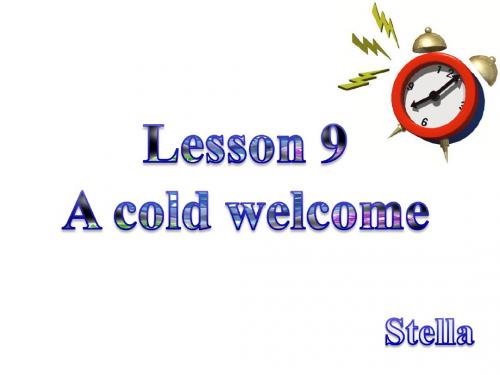
strike(struck, struck) v. 打动;给…以印象,迷住 e.g. She struck his heart. n. [C]罢工 e.g. The workers in that factory are on strike.
因恐惧、痛苦
cry&shout ?
为了引起注意
true a. 真实的;可靠的;准确的 e.g. My dream came true. 我的梦想实现了。 refuse v. 拒绝,不接受 e.g. He refused to work for her. e.g. He can’t refuse him anything. refuse to do sth.拒绝做某事 refuse
happen v. 发生;碰巧,恰好 e.g. An earthquake happened when I 一般指没有计划到或想到的偶然“发生”,后接 to do或用 happen 于It happened that…句型。 happened not to be there. 通常指经过事先安排后的“发生”,因而又有“举行、进 take place 行”的意义。 我碰巧不在那儿的时候发生了地震。
He jumps quite____( Nhomakorabeaell)
Ming is much____(thin)than him
His eyes are a little __(big) than xie's
The car is far____(expensive)than that
more famous now, Who is ___________ Jeremy Lin or Yao Ming?
新概念第二册lesson9

under 垂直下方 over 垂直上方 above 上方 below 下方
TEXT
TEXT
strike strike struck struck/stricken She struck the man in the face. strike the clock Listen, the clock is striking. strike twelve
Lesson 9 A cold welcome
How many months are there in a year? What’s your favorite month? Why?
write as many festivals as you can
Write down festivals in each month as quickly as you can
语法知识沉淀: 表示时间的介词
5. until=till :到… eg: I sometimes stay in bed until lunchtime.
from…till 从…到…: eg:The shops are open from 9 till 5.
not…until 直到… 才: Eg: He will not arrive until 10 o’clock.
2. happen vi. (偶然)发生,物作主 语,不能用被动语态 happen to do sth. 碰巧做某事 eg:Yesterday I happened to meet one of my old friends.
语法知识沉淀: 表示时间的介词
表示“在何时”常用介词at, on, in等 1. at一般用来表示在某一具体的时间点
10:10 ten past ten 11:50 ten to twelve 09:45 a quarter to ten 06:30 half past six
新概念英语第二册第九课课文
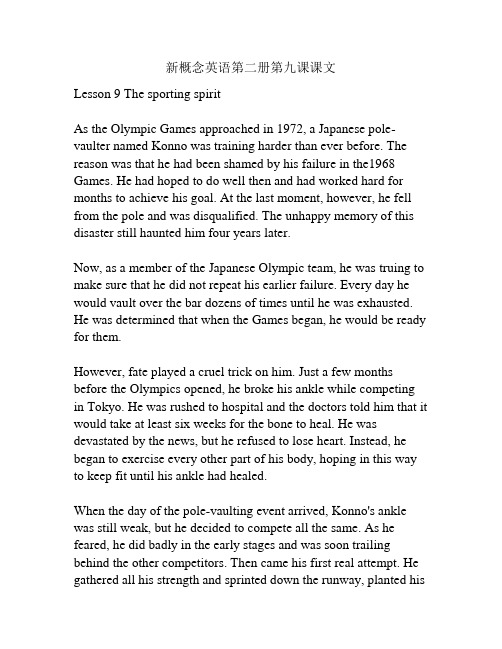
新概念英语第二册第九课课文Lesson 9 The sporting spiritAs the Olympic Games approached in 1972, a Japanese pole-vaulter named Konno was training harder than ever before. The reason was that he had been shamed by his failure in the1968 Games. He had hoped to do well then and had worked hard for months to achieve his goal. At the last moment, however, he fell from the pole and was disqualified. The unhappy memory of this disaster still haunted him four years later.Now, as a member of the Japanese Olympic team, he was truing to make sure that he did not repeat his earlier failure. Every day he would vault over the bar dozens of times until he was exhausted. He was determined that when the Games began, he would be ready for them.However, fate played a cruel trick on him. Just a few months before the Olympics opened, he broke his ankle while competing in Tokyo. He was rushed to hospital and the doctors told him that it would take at least six weeks for the bone to heal. He was devastated by the news, but he refused to lose heart. Instead, he began to exercise every other part of his body, hoping in this way to keep fit until his ankle had healed.When the day of the pole-vaulting event arrived, Konno's ankle was still weak, but he decided to compete all the same. As he feared, he did badly in the early stages and was soon trailing behind the other competitors. Then came his first real attempt. He gathered all his strength and sprinted down the runway, planted hispole firmly in the ground and hurled himself into the air. For a heart-stopping moment, he seemed to be failing again, but somehow he managed to twist his body so that he fell across the bar without knocking it off. The crowd cheered wildly as the judges signalled that the jump was successful.Konno was encouraged by his success and went on to make two other jumps, each one slightly better than the last. When the competition ended, he found to his amazement that he had won a bronze medal. It was not the gold medal he had hoped for, but it was still an achievement of which he could be proud.The story of Konno teaches us an important lesson about sport. It is not enough merely to possess great physical ability. To be a true sportsman one must also have courage, determination and, above all, the sporting spirit. The true sportsman does not lose heart when he is defeated. He picks himself up and tries again, even if he is handicapped by injury or illness. He strives to do his best under all circumstances, never forgetting that it is not winning but taking part that counts. This is the sporting spirit, and it is the noblest of all human qualities.。
新概念英语第二册第9课Lesson9-A-cold-welcome
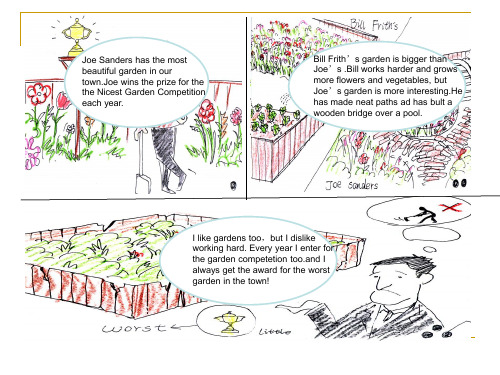
twelve, the clock stopped. The big minute
hand did not move.
Read together or one by one
• We waited and waited, but nothing happened.
• Suddenly someone shouted, “It's two minutes past twelve. The clock has stopped!”
引导时间壮语的介词:in /on /at/during/till &until
➢in:
1. 表示一天当中的某一段时间 e.g.:in the morning/ afternoon/ evening 2. 表示月份、年份: e.g.: in March/ September/ 2008 3. 表示季节: e.g.: in spring/ winter 4. 表示“在某段时间之内” e.g.: I always eat my breakfast in ten minutes. 5. 表示“…时间之后”, 与将来时连用 e.g.: The teacher will be arrive in ten days.
crowd of peo突p然le意识h到a,d突然g出a现thered under the Town
A rather worrying thought struck me.
Hall clock.
• It would strike twelve in twenty minutes’ time.
• Fifteen minutes passed and then at five to
Grammar Time
新概念2册Lesson_9_A_Cold_welcome
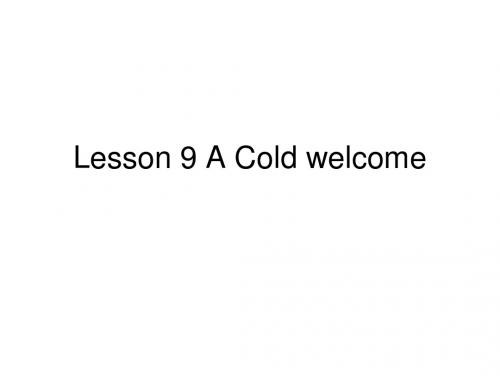
crowd n. 人群
• • • • • Crowd 人群(大) Group 小组(小) A crowd of people A group of people Crowded 拥挤的 spacious 宽敞的
gather v. 聚集
• • • • • • Get together =Gather 1.自己走到一起 People gather here every year. 2.把别的对象聚集在一起 Life gathers us here God gathers us here with love.
From..to
• I have lived here from 2000 till now. • I have lived here since 2000 • Since+从。。。至今=from.. To now,till now
During /in
• I take some good pictures in the summer
关于速度
• In 13 secondv13秒之内
• At 100 meters a second 以。。。的速度
【Special Difficulties】
• Any,Not...Any and No
完全没有-not any-no
• • • • • • • No= not any(根本没有) Not any=no I have no money. I have not any money I haven’t any money. There are no dogs. There are not any dogs.
hand
n. (表或机器的)指针
• Hour hand时针 • Minute hand 分针 • Second hand 秒针
新概念第二册Lesson_9_A_cold_welcome
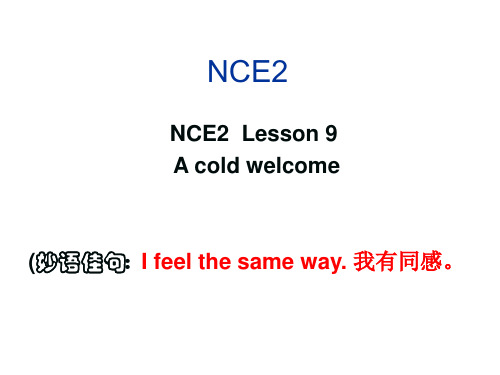
We waited and waited, but nothing happened.
Suddenly someone shouted.
It's two minutes past twelve! The clock has stopped!'
I looked at my watch. It was true.
At that moment, everybody began to laugh and sing.
The big clock refused to welcome the New Year.
How many months are there in a year? What’s your favorite month? Why?
Look
at the pictures.
Free talk
write as many festivals as you can
Write down festivals in each month as quickly as you can
年、月、年月、季节、周 即在“来年”, 在“某月”,在“某年某月” (但在某年 某月某日则用on),在四季,在第几周,将 来时等都要用in。 in 1986 in April in December 1986 in spring in autumn in the fist week of this semester in the third week. They will come back in 10 days.
(完整word版)新概念英语第二册第九课

Lesson 9 A cold welcomeOn Wednesday evening, we went to the Town Hall. It was the last day of the year and a large crowd of people had gathered under the Town Hall clock. It would strike twelve in twenty minutes' time. Fifteen minutes passed and then, at five to twelve, the clock stopped. The big minute hand did not move。
We waited and waited, but nothing happened。
Suddenly someone shouted. 'It’s two minutes past twelve! The clock has stopped!' I looked at my watch。
It was true. The big clock refused to welcome the New Year。
At that moment, everybody began to laugh and sing.New words and expressions 生词和短语welcome n。
欢迎;v. 欢迎 crowd n。
人 gather v. 聚集hand n. (表或机器的)指针shout v. 喊叫 refuse v。
拒绝 laugh v. 笑参考译文星期三的晚上,我们去了市政厅。
那是一年的最后一天,一大群人聚集在市政厅的大钟下面。
再过20分钟,大钟将敲响12下.15分钟过去了,而就在11点55分时,大钟停了。
那根巨大的分针不动了。
新概念英语第二册课件Lesson 9 (共21张PPT)
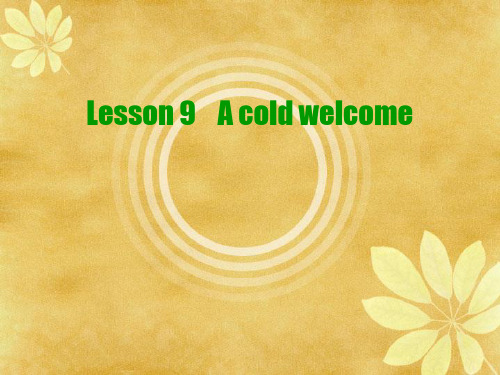
• 2. (眉等)皱起
• 3. 生脓,化脓 名词 n. 1. 聚集
• 2. 收获量
gather指人们聚 集在一起,尤指 自发性的聚集
• 3. 衣褶
• refuse
美音:[rɪ'fjuz]
• refuse 1 及物动词 vt. 1. 拒绝;拒受;拒给;不准[O1] He refused my offer of help. 他拒绝了我的帮助。
1st •表示具体时间 on Wednesday
evenday
•用at的时间短语:
•表示确切时间 at five to twelve •表示用餐时间 at lunchtime •表示具体时间 at night
• during 在···期间 • during the hoilday 强调假期从头到尾 • from ···till ··· 指一段明确的时间 • until 直到 • until的主句和从句两个都用一般过去时(
refuse sb\sth refuse to do
•welcome 美音:['wɛlkəm]
• welcome sb to+地点 • a warm welcome 热烈的欢迎 • You are welcome to+地点
• strike
美音:[straɪk]
• v:打,击,弹,敲···(钟,乐器···)
• 5. 猜想,推测+(that) I gather that he is the one in charge. 我猜想他是负责的人。
• 6. 使皱起
She gathered her brows into a frown. 她皱起了眉。
• 不及物动词 vi. 1. 积聚;集合
新概念第二册Lesson9_课文
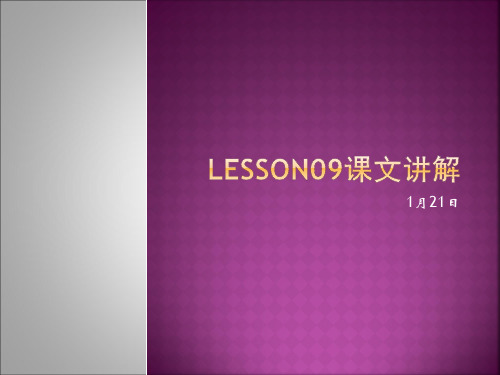
文中的时间状语及介词的使用: On
Wednesday evening In twenty minutes At five to twelve It‟s two minutes past twelve! At that moment
对疑问句的两种不同的否定回答: --Is
After
Exercise
用正确的介词填空 1) He has gone abroad. He will return___ two year‟s time. 2)___Saturdays I always go to the market. 3) I never go to the cinema_____ the week. 4) He ran a hundred meters___ thirteen seconds. 5) I can‟t see him ____ the moment. I‟m busy. 答案:in ; On; in/during; in; at
there any tea in the pot? -- There isn‟t any tea in the pot. There‟s no tea in the pot.
--
Is there anyone at the door? -- There isn‟t anyone at the door. There „s no one at the door.
3.
It refused to welcome the New Year. It____. A. denied it B. wanted to C. didn‟t want to D. wished to
分析:A,否认,拒绝承认
(完整版)新概念英语第二册课文+练习测试Lesson9
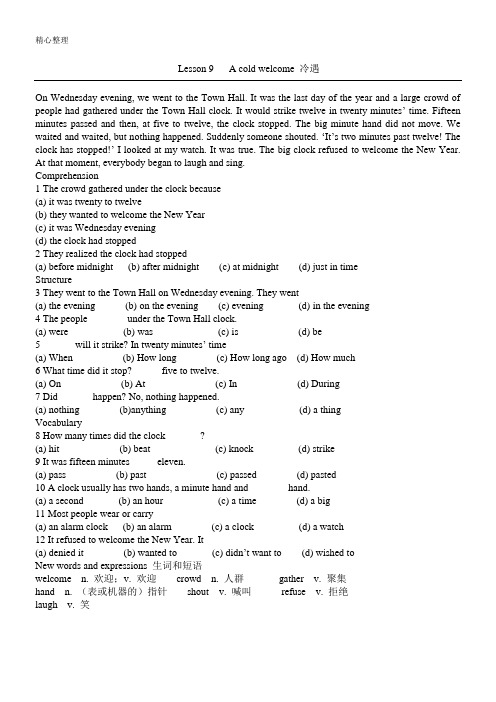
6 What time didit stop?_____ fivetotwelve.
(a)On(b)At(c)In(d) During
7Did______happen? No, nothing happened.
(a)nothing(b)anything(c)any(d) a thing
Vocabulary
8 How many times did the clock______?
(a)hit(b)beat(c)knock(d) strike
9 It was fifteen minutes_____eleven.
(a)an alarm(d) a watch
12 It refused to welcome the New Year. It________
(a)denied it(b)wanted to(c)didn’t want to(d)wished to
(a)the evening(b)on the evening(c)evening(d) in the evening
4 Thepeople_______under the Town Hall clock.
(a) were(b) was(c)is(d) be
5______ will it strike? In twenty minutes’time
Lesson 9 A cold welcome冷遇
On Wednesday evening, we went to the Town Hall. It was the last day of the year and a large crowd of people had gathered under the Town Hall clock. It would strike twelve in twenty minutes’time. Fifteen minutes passed and then, at five to twelve, the clock stopped. The big minute hand did not move. We waited and waited, but nothing happened. Suddenly someone shouted.‘It’s two minutes past twelve! The clock has stopped!’I looked at my watch. It was true. The big clock refused to welcome the New Year. At that moment, everybody began to laugh and sing.
新概念第二册第9课

refuse v. 拒绝
refuse to do sth 拒绝干某事 例句:那个大钟不愿意迎接新年。
The big clock refused to welcome the New Year.
shout v. 喊叫
call 呼叫, scream 尖叫(机器等)发出尖锐刺耳的声音 yell 狂叫(感情丰富的)
shout at 向…大喊 / shout to 朝…大声喊话
e.g. He shouted at me angrily. He shouted to me: “Your bag is lost.”
Questions:
1. Why did the crowd gather under the clock? Because they wanted welcome the new year.
2. When did the crowd realize the clock had stopped?
Big Ben
Westminster Bridge
Thames It was built in 1859 by Benjamin Hall
It’s famous for its immense size and extremely accurate.
The big clock refused to welcome the New Year.
新概念第二册第9课
2020/9/21
Lucy
Percy Buttons
1
William
A private
conver2sation
新概念英语第二册第9课

课文讲解
• On Wednesday evening, we went to the Town Hall. It was the last day of the year and a large crowd of people had gathered under the Town Hall clock. It would strike twelve in twenty minutes' time. Fifteen minutes passed and then, at five to twelve, the clock stopped. The big minute hand did not move. We waited and waited, but nothing happened. Suddenly someone shouted. 'It's two minutes past twelve! The clock has stopped!' I looked at my watch. It was true. The big clock refused to welcome the New Year. At that moment, everybody began to laugh and sing.
• It was the last day of the year and a large crowd of people had gathered under the Town Hall clock. • the last day of the year 一年中的最后一天 • 一周中的最后一天 • the last day of the week • a large crowd of people 一大群人
新概念英语二Lesson9-a-cold-welcome

On Wednesday evening, we went to the Town Hall. It was the last day of the year and a large crowd of people had gathered under the Town Hall clock.
on引导的表时间的短语: ① 表示星期:on Monday;on Friday ② 表示日期:on October 10th;on March 23rd ③ 表示具体某天的早中晚:on Wednesday evening;on a fine afternoon;on that day
Will you help me to hand out the leaflets at the meeting? 散发,分发
He has handed over his business to his son. (把某事) 交给…负责
Shout call out/cry out 大声叫唤,大声哭喊
eg: During the past few years, there has been a drop in new AIDS cases in wealthy nations.
(From)…until…指一段明确的时间
Then, I am still and wait here in the silence,
It would strike twelve in twenty minutes' time. Fifteen minutes passed and then, at five to twelve, the clock stopped. The big minute hand did not move.
新概念英语第二册Lesson9(共48张PPT)
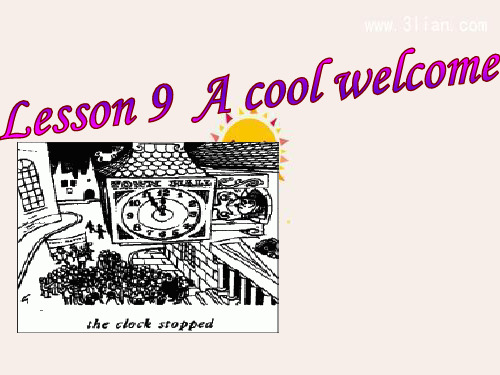
★hand n. (表或机器的)指针;手 “minute hand”是分针 “hour hand”是时针; “second hand”是秒针。 second-hand 二手的,旧的 The shop sells second-hand goods(商品). Hand in hand e.g. I saw you guys in the street hand in hand hand in sth.递交 Hand in your writing, please? in hand 在手头: I still have some money in hand. on hand在手边;在近处、 hand down把……传下来。 hand and foot (adv.)手脚一起;完全;尽力地
冷遇是什么意思?
cold welcome 意为冷淡的待遇。 结合课文的语境,文中的cold welcome 指的是大钟没有准时地在新年时刻打响。文中说道的“The big clock refused to welcome the New Year. ”(大钟拒绝欢迎新年)是一种拟人的修辞手法。 一般句子中有refuse意为“拒绝”作谓语的话,习惯都用有独立意识的事物作为主语。
新概念英语第二册第九课课文详解

Lesson 9 A cold welcome 冷遇 ⼀、⽣词讲解 1、welcome n. 欢迎;v. 欢迎 a cold welcome 冷遇 welcome to+地点 例如:welcome to China You are welcome./welcome adj.或You are welcome to+地点 例如:welcome to my home/welcome home/ welcome back 2、crowd n. ⼈群 crowd :in the crowd I spotted him in the crowd ⼀眼看见 a crowd of people 没有次序的⼈群,拥挤的⼈群 a group of people 有次序的⼈群 crowd v.拥挤,挤满 a large crowd of people ⼀⼤群⼈/crowds of people 许多⼈,⼈⼭⼈海 3、gather v. 聚集 people gathered ⼈们聚集在⼀起,尤指⾃发性的聚集 4、hand n. (表或机器的)指针 hand n.⼿ minute hand/second hand/hour hand second hand ⼆⼿的,旧的 wait me a moment/wait me a few seconds(for a few seconds.) 5、shout v. 喊叫 call out ⼤声喊叫 cry out ⼤声哭喊 scream 尖叫 ⼆、本⽂重点语法讲解 本篇课⽂的重点是时间介词的⽤法。
这部分知识点实⽤性很强,在PET, BETS2 中是必考项⽬,同时在⼩升初考试中也是完形填空常考知识点。
只要多⽐较,多练,通过造句⼦区分各个知识点,学⽣⼤部分都能将这部分知识点掌握好,尤其时想在考试中拿⾼分的学⽣,千万不要忽视这样的细节知识点哦! 让我们来看看具体的时间介词家族成员吧: At:表⽰在某时刻,时间,阶段,如at noon 在中午,at night在夜晚,还有具体时刻at 12 o'clock等;时刻前的介词⽤at:at five to twelve作时间状语 In :强调在⼀段时间内,如在早,午,晚in the morning, in the afteronno, in the evening. 课⽂中in twenty minutes' time 20分钟之后,in 表⽰在段时间以后,根据时态判别in 表⽰的含义。
新概念2 Lesson 9 A cold welcome
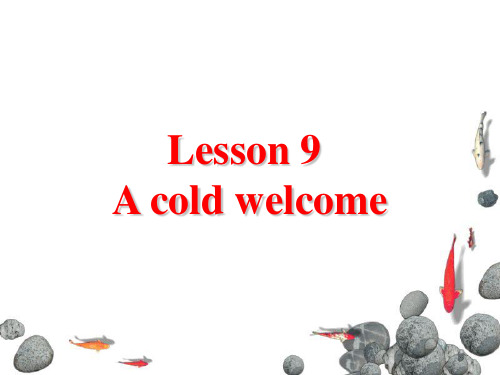
---3 minutes' walk.
• Fifteen minutes passed and then, at five to twelve, the clock stopped.
• …(some time) passed and then, sth. happened ……时间过去了,……
my shout是 “我做东;我 请客”的意思
shout
★ v. 喊叫 • call out 大声喊叫 • cry out 大声哭喊 • scream 尖叫 • Shout to • Shout at
refuse
• 我们学过“refuse”有(v.)拒绝的意思,但它 也有“垃圾”(n.)、“没用的”(adj.)的意思 。
★ It would strike twelve in twenty minutes' time.
Strike Struck Stricken
① v. 打,击 earthquake-stricken area poverty-stricken area
②பைடு நூலகம்v. 敲,弹(钟,乐器等)
strike the clock (人)敲钟
refuse to do 拒绝做某事 household refuse 生活垃圾 refuse collector 垃圾搜集车
laugh
• “laugh”是发笑、笑、嘲笑的意思,而作为名词 时意思为笑料、笑声。
• 关于“laugh”的短语有: laugh at嘲笑, 因 ... 而笑 laugh over 想着 ... 发笑 laugh away一笑置之
Ho表w 示far所is有th关e 系sc,ho叫ol做fro名m词h所er有e?格3。minutes’
新概念英语第二册 Lesson 9课件

1.+世纪 in the 21st century 2.+季节
in
in spring
in summer
in autumn
in winter
in
3.+年代、年份、月份
在20世纪90年代 in the 1990s
在1990年
in 1990
在九月
in September
4.+泛指的上午、下午和傍晚
在上午 在下午 在傍晚
Lesson 9
A cold welcome
01
New words
New words
1.crowd /kraʊd/ n.人群;群众 A small crowd gathered outside the church. 一小群人聚集在教堂外。 a crowd of 一群 Mr. Frank was followed by a crowd of students. 弗兰克先生后面跟着一群学生 crowded /ˈkraʊdɪd/ adj.拥挤的—uncrowde 不拥挤的 By ten o’clock the bar was crowded. 到了十点钟,酒吧里非常拥挤。
2.hand /hæ nd/ n.手;(表或机器的)指针
➢ hand in hand 手牵手 They walked away hand in hand. 他们手拉ห้องสมุดไป่ตู้走了。
➢ lend/give a hand 伸出援手 He always lends a hand when we are in trouble. 当我们遇到困难时,他总是伸出援手。
hand v.交;递 ➢ hand in 上交(作业等)
The teacher told the students to hand in their exercises. 老师要同学们上交练习题。 ➢ hand out 分发 I’ll hand out advertisements after school. 放学后我会发广告。
- 1、下载文档前请自行甄别文档内容的完整性,平台不提供额外的编辑、内容补充、找答案等附加服务。
- 2、"仅部分预览"的文档,不可在线预览部分如存在完整性等问题,可反馈申请退款(可完整预览的文档不适用该条件!)。
- 3、如文档侵犯您的权益,请联系客服反馈,我们会尽快为您处理(人工客服工作时间:9:00-18:30)。
词源扩展
Tips • 逻辑辩证记忆提示: • Fuse、,fund来自拉丁文fundere(=to pour; to cast)及其过去分词 fusus。 • refusal/ ri5fju:zEl / n.拒绝 • fuse/ fju:z /n.1.保险丝,熔丝 2.导火线,导火索 • v.1.熔合,合并 2.(使)因保险丝熔断而中断工作 • confuse/ kEn5fju:z / vt.1.使困惑,把…弄糊涂 2.混淆,把…混同 3. 混乱,搞乱 • confusion/ kEn5fju:VEn / n.1.困惑,糊涂 2.混淆 3.混乱,骚乱 • diffuse/ di5fju:z / v.1.扩散,(使)弥漫 2.传播,散布 • / di5fju:z / a.1.(文章等)冗长的,漫无边际的 2.四散的,弥漫的 • diffusion / di5fju:VEn / n.扩散, 传播, 弥漫
语法重点:介词
• • • • • • • 早、午、晚,要用in,at 黎明、午、夜、点与分; 年、月、年月、季节、周,阳光、灯、影、衣、冒in; 将来时态in...以后,小处at 大处in; 有形with 无形by,语言、单位、材料in; 特征、方面与方式、心情、成语惯用in; 日子、日期、年月日,星期加上早午晚; 以上全部都用on; 年月日,加早午晚,of 之前on 代in;
crowd
★ n. 人群 • in the crowd 在人群中 • I spotted Jeremy in the crowd. • 我在人群中一眼就认出了Jeremy. • a crowd of people 没有次序的人群, 拥挤的人群 • a group of people 有次序的人群 • crowd v.拥挤, 挤满 • a large crowd of people 一大群人 • 人山人海 • crowds of people
gather
★ v. 聚集 • gather 常用语,自发性的聚集 • The clouds are gathering. • people gathered 人们聚集在一起 • collect 有计划、有选择的收集 • He collects stamps. • assemble [E5sembl]为某一特定的目的而集 合 • The dean assembled the students in the auditorium. [7C:di5tC:riEm] • muster [5mQstE]正式用语,为检阅检查而召 集,特指部队召集 • He mustered all his soldiers.
in
• in(范围内…) • 1、段时间 • in fifteen minutes/in two hours/in a few days/in a week • 2、早中晚 • in the morning/afternoon/evening • 3、月季年 • in May/in spring/in 2007 • 4、过去与将来 • in the future/in the past/in twenty minutes' time(用于将来时)
None 2
• 1)None of us have/has seen him. 2)—How many students are there in the room? —None. 3)—Is there any water in the thermos? —None. 4)He would like some orangr juice, but there is none left in the bottle. 5)—How much money do you have on you? —None. 注意:none指的是三者或三者以上的人或物中“没有一 个”,如果指两者中“没有一个”应用neither。 请比较: There are many apples in the basket, but none of them are of fresh.篮子里有许多苹果,但没有一个是新鲜的。 Neither of his parents is at home.他的父母都不在家。
【New words and expressions】
生词和短语 ★welcome n. 欢迎 v. 欢迎 • a cold welcome 冷遇 • welcome to+地点 • welcome to China • welcome to my home • welcome home/welcome back
No one 1
• 1. no one • no one=nobody,只能指人,但不具体指 什么人,不能指物,语气比none强,后面 不能接of构成的短语。no one作主语时,谓 语动词只能用单数形式。
No one 2
• 如:No one/Nobody likes a person with bad manners.没有人喜欢不讲礼貌的人。 no one一般用来回答who,及含 anyone,anybody引起的疑问句。如:— Who is in the room? —No one. —Is there anyone in the room? —No one.
种种拒绝
• • • • • • • • • • • • • • • decline/di5klain/ vi.下倾, 下降, 下垂 v.拒绝, 衰落 n.下倾, 下降, 下垂, 斜面, 斜坡, 衰败, 衰落 He declined their invitation. 他婉言谢绝了他们的邀请. refuse/ri5fju:z/ vt.拒绝, 谢绝 n.废物, 垃圾 He deemed it wise to refuse the offer. 他认为拒绝这一提议是明智的。 exclude/iks5klu:d/ vt.拒绝接纳, 把...排除在外, 排斥 The club excluded women from membership. 该俱乐部拒绝妇女入会。
• It’s two minutes past twelve. • past • to
基本时间介词的用法
• • • • • • at/in/on/during/through at(在…) 1、手表上的时间点 at nine/at half past nine 2、固定时刻,日期 at noon/at night/at dawn/at dusk/at the weekend/at Christmas • 3、起始终止 • at the beginning of…/at the end of…/at first
cold
• • • • a cold welcome 冷遇 cold 冷的, 寒冷的, 冷淡的 cold fish 冷漠的人 My brother is a cold fish.
strike
• • • • • • v. 敲 strike the clock 敲钟 clock strikes 钟自己响 Listen, the clock is striking. strike twelve knock at the door/window
Lesson 9 A cold ห้องสมุดไป่ตู้elcome
Jockey
Listening
• What are these people doing in the text? • They are waiting for the coming of new year.
倒数计时活动的由来
倒数计时的活动是美国时代广场在1904年首 次举办的,1907年第一次举办水晶球跨年活动, 百年来风靡全球,已经成为纽约甚至全美最主要 年度活动之一。每年都有近百万人在午夜时分挤 上纽约时代广场,随着象征和平的水晶球在倒数 最后一分钟缓缓从天而降,现场气氛热烈到最高 点。尽管美国拉斯维加斯、迈阿密,甚至其他国 家都在仿效举办类似大型活动,但依旧不敌纽约 时代广场的超级魅力,每年全球有超过十亿人透 过电视实况转播观赏整个活动
TEXT
• On Wednesday evening, we went to the Town Hall. It was the last day of the year and a large crowd of people had gathered under the Town Hall clock. It would strike twelve in twenty minutes' time. Fifteen minutes passed and then, at five to twelve, the clock stopped. The big minute hand did not move. We waited and waited, but nothing happened. Suddenly someone shouted. 'It's two minutes past twelve! The clock has stopped!' I looked at my watch. It was true. The big clock refused to welcome the New Year. At that moment, everybody began to laugh and sing.
shout
★ v. 喊叫 • call out 大声喊叫 • cry out 大声哭喊 • scream 尖叫 • Shout to • Shout at
refuse
★ v. 拒绝 • 常与to连用,refuse to… • She refused to help me. • refuse to do sth. 拒绝做某事 • refuse sth. 拒绝某物(事) • refuse sb. 拒绝某人
hand
★ n. (表或机器的)指针 • n.手 • minute hand/second hand/hour hand • second hand 二手的, 旧的 • wait me a moment • wait me a few seconds (for a few secs.) • secs. seconds的缩写
